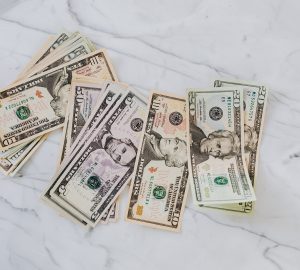(5 minute read)
Being a student can be a magical time. You get to meet new people, learn new and challenging things, and have new experiences. And once you get a higher educational degree, it benefits your life in so many ways from the doors it opens personally and professionally. But if you’re like 46 million other people in America, then you had to take out student loans to get your degree, and now you have student loan debt. Although some days it can feel like you are never going to get out from underneath it, I’m sure your goals are like everyone else’s: how do I pay this off faster?! So I’ve put together three easy steps you can do today to pay off your student loan debt faster.
1. Pay every other week instead of monthly.
When you pivot from a monthly payment into a payment every two weeks, you sneak in another two payments per year. Since there are 52 weeks in a year, you will make 26 payments instead of 24 if you were to split your monthly payment into a payment every two weeks. And every time you make a payment above and beyond your regular payment, it gets applied directly to your principal. This is helpful not only because it helps you shave off more of the core of your student loan per year, but it also reduces the total interest you will pay over the life of the loan.
Calculate how much you can save by entering your current loan balance and then on the next screen, inputting how much extra you will contribute per year. For example, if you have $50,000 out in loans and your current monthly payment is $1000, then two extra payments a year would be another $1000 (because you would break your current regular payment in half and pay that every two weeks). You would end up saving 11% interest and pay off your loan 11% faster. How cool is that?!
2. Refinance for a lower interest rate or to reduce the amount of time you have left.
If you owe more than $50,000 in student loans, or if you have multiple loans you want to consolidate, or if you are paying a high-interest rate, then refinancing could be the right route for you. Two and a half years ago, I refinanced mine with Earnest. When I was in graduate school, I took out five different loans from the government, all of which had an interest rate of 5% or higher, and three years after I graduated, I still owed over $125,000 on all of them together.
If you do want to refinance, you want to be clear about what your goals are in refinancing. Do you want to consolidate into one monthly payment to make it easier on yourself? Do you want to lower your overall interest rate (this is a big reason to refinance)? Do you want to pay off your loans in a shorter period of time? These are all things to consider and questions you should know when considering if refinancing is right for you. My goals were to reduce the amount of time I had left to pay on my loans and decrease my overall interest rate.
A word to the wise – if one of your goals is to reduce the amount of time you have left on your loans through refinancing, then you will most likely have to increase your monthly payment. For example, when I refinanced, I was able to reduce the amount of time I had left on my loans by five years by more than doubling my monthly payment. I was, however, also able to reduce my interest rate by refinancing, so more of my monthly payment went towards my principal.
There are also multiple private companies you can refinance with. Keep in mind your deferment or hardship options might be limited if you switch to a private company, and government benefits (such as no interest payments on loans that happened during the pandemic) do not extend to private loans. Make sure you know the difference between fixed payments and variable payments and make sure you understand the payment length and terms before refinancing.
3. Make extra payments, no matter how small, after you meet your regular payment.
Every time you pay beyond your regular payment, that amount goes directly to your principal. Now, why does that matter so much, and how can that help you pay off your student loan debt faster? Because the amount of interest that accumulates each month is calculated directly off the amount of principal you have outstanding.
So the lower you can bring the principal down, the more it will reduce the overall amount of interest you will pay. And paying less in interest is precisely what you want to do. Your hard-earned money should go towards the actual loan amount and not to the amount someone else is making on it because the interest you are paying on your loan is someone else’s passive income. So you should try to reduce your principal as fast as you can so you pay as little interest as possible and reduce your timeline to pay off.
—
Having student loan debt is hard, I feel ya. But with these three easy (and hopefully simple) steps, you should be well on your way to paying off your student loan debt sooner and reducing the amount of interest you will pay on your student loans. Don’t forget to make sure you are accounting for your student loan payment (and the interest it is earning) in your budget every month. If you need help setting up a budget, check out my How to Start a Budget for Beginners post.
Do you have other tricks and tips for paying down your student loan debt faster? Please share! Drop me an email or comment on this post.
As always, stay happy and healthy!
Xoxo,
Amy





